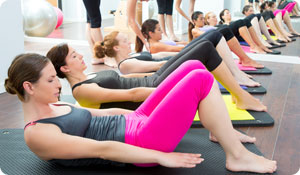
While the concept of exercising away your allergies sounds appealing, in reality no amount of running, swimming, or lifting weights will make your allergies magically disappear. However, engaging in regular exercise can help alleviate bothersome symptoms.
Some doctors say that exercise can be an effective way to treat allergies—as long as you aren't feeling sick at the time of your workout. When you get active, your nose serves as an important filter that warms the cool air and removes any allergens and pollutants it contains. In addition, studies reveal that exercise gets your blood pumping faster to move allergens more efficiently through your body and release them through your skin and kidneys instead of allowing them to remain stagnant and cause inflammation and other allergy-related symptoms.
Location Matters
Exactly where you exercise can make all the difference. For instance working out in a health club can help limit your contact with seasonal allergens and can ensure the air temperature will remain consistent. Just be sure that you won't be coming into contact with cleaning chemicals or scents that can make your allergies flare.
If you prefer to exercise outside, always check the pollen count, and choose a location where you won't be exposed to many triggers.
Consider heading to an indoor pool since the humidity of the air can wash away allergens and help relieve your symptoms without putting too much strain on your lungs.
Warming Up
Experts from the American Academy of Allergy, Asthma, and Immunology stress the importance of warming up before beginning any strenuous activity. A 10-minute warm up that consists of light stretching and easy cardio moves can help your body ease into your workout without putting undue strain on your heart and lungs. A cool-down afterward can also be essential. You may want to consider activities like yoga or Pilates, which can help you master proper breathing techniques that can also help you manage allergy symptoms and allergic asthma.
Just be sure to carry a fast-acting relief inhaler if you're prone to asthma as well as an EpiPen® when you exercise outdoors if you suffer from insect allergies.
A Word of Caution
If you're in the middle of a full-blown allergy attack and you wonder if you should push yourself and go for a jog or do some weight lifting hoping that it will provide some relief, the experts stress that this isn't the right time to try to reap the benefits of exercise for allergies. If you're already suffering from nasal allergy symptoms such as stuffy nose, engaging in exercise will actually make you feel worse. This is because forcing to breathe in through your mouth will draw in cool air that contains allergens and other pollutants right into your lungs and airways, potentially triggering an allergic asthma attack.
The best way to avoid this problem is to take an antihistamine, decongestant, and/or saline or steroid nasal spray to help clear your nasal passages before you hit the gym.
Sources:
"Avoid Allergy and Asthma Triggers as You Shape Up." American College of Allergy, Asthma, and Immunology. ACAAI, n.d. Web. 18 July 2011.
"Exercise." National Jewish Health. NationalJewish.org, June 2009. Web. 18 July 2011.
"Exercising with Allergies and Asthma." American College of Allergy, Asthma, and Immunology. ACAAI, n.d. Web. 18 July 2011.





